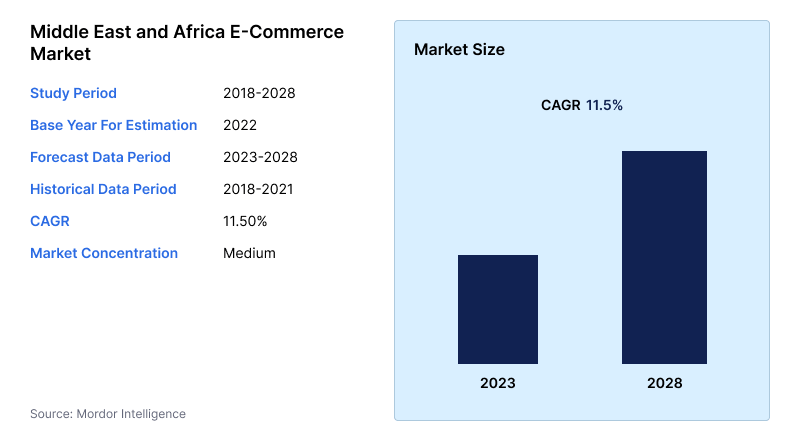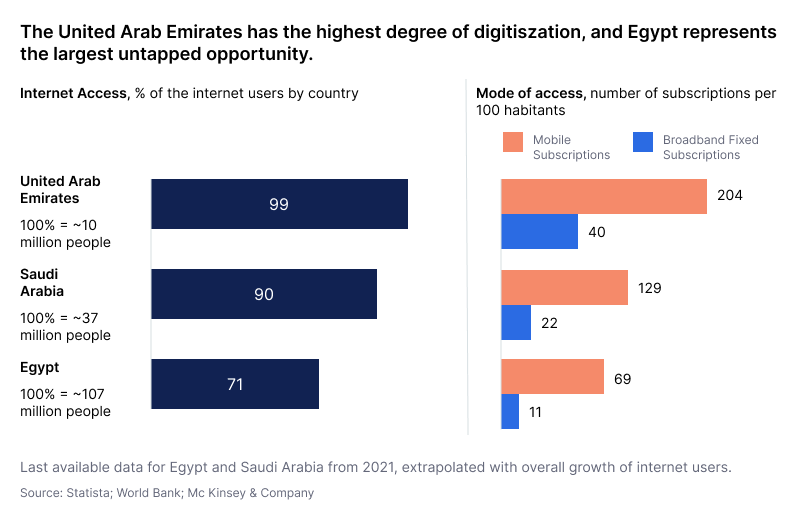In recent years, the Middle East has emerged as a thriving hub for e-commerce, capturing the attention of entrepreneurs and businesses worldwide.
This region has witnessed exponential growth in its e-commerce industry, with a rate that outpaces even the booming markets of the Asia Pacific region.
If you are considering entering the e-commerce marketplace in the Middle East, this is the perfect time to do so. In this blog, we will explore the incredible opportunities the Middle East offers for e-commerce businesses and how to get started on your journey to success.
eCommerce Opportunity In the Middle East Market
The Middle East’s e-commerce landscape is filled with potential. Here are some compelling reasons why you should consider focusing on this dynamic market.
According to Mordor Intelligence the Middle East eCommerce market is projected to grow at a CAGR of over 11.5% from 2022-2028, driven by high internet penetration, mobile shopping, and AI integration.

COVID-19 accelerated the shift to online shopping. Key players include Amazon, Alibaba, and Shopify. Emerging trends involve technology adoption and the rise of smartphones, fostering digital commerce in the region.
Rapid Growth
The Middle East has been experiencing e-commerce growth at an astonishing pace, with a rate twice as fast as the Asia Pacific region. This growth is driven by factors such as increasing internet penetration, a young and tech-savvy population, and changing consumer behaviour.
High Internet Penetration
One of the driving factors behind the e-commerce boom in the Middle East is the remarkable increase in internet penetration. As more people gain access to the internet, a larger market for online shopping opens up.
This connectivity is not only limited to urban areas but is spreading to rural regions as well, creating a broader customer base.

Expanding Middle Class
The region is seeing a growing rapidly middle class with rising disposable income levels. This growing purchasing power translates into increased demand for online shopping, making it an attractive prospect for e-commerce businesses.

Mobile-First Population
Middle Eastern consumers are highly mobile-oriented, with a significant percentage of online transactions occurring through mobile devices. This presents a unique opportunity for businesses to tap into this mobile-savvy user base.
Undeveloped Markets
While certain countries like the UAE and Saudi Arabia have well-established e-commerce markets, there are still many undeveloped markets within the Middle East. Exploring these emerging markets can provide a first-mover advantage.
What Do You Need to Start an eCommerce Marketplace in the Middle East?
Now we have established the huge potential of the Middle East e-commerce market, let’s discuss the essential elements you need to launch your e-commerce marketplace in the region.
Web Hosting Service
Choosing a reliable cloud infrastructure hosting service is crucial for ensuring your e-commerce platform runs smoothly. Consider providers that offer excellent uptime, security features, and scalability to accommodate your growth.
We will explore the options provided by Google Cloud, AWS, and Microsoft Azure in the Middle East and their respective data centre locations.
Google Cloud in Tel Aviv, Doha, and Dammam
Google Cloud offers a strong presence in the Middle East, with data centre locations in Tel Aviv, Doha, and Dammam. By choosing Google Cloud, you can benefit from low latency and high-speed connectivity within the region, ensuring seamless access to your e-commerce platform.
AWS Cloud in UAE and Bahrain
Amazon Web Services (AWS) has data centres in the United Arab Emirates (UAE) and Bahrain, offering reliable cloud hosting services in the Middle East. AWS is known for its vast array of services and flexible pricing options, making it suitable for businesses of all sizes.
Microsoft Azure in Dubai and Abu Dhabi
Microsoft Azure boasts data centre locations in Dubai and Abu Dhabi, providing another solid option for hosting your e-commerce marketplace in the Middle East.
Azure’s integrated services, including AI and machine learning capabilities, can help you enhance user experiences and streamline business operations.
Domain Purchase
Selecting an appropriate domain name that resonates with your brand is essential. Ensure it is easy to remember and relevant to your target audience.
Inventory Management
Efficient inventory management is vital to ensure you can fulfil orders promptly and avoid stockouts or overstocking. Utilize inventory management software to streamline this process.
Payment Processing
Offer a variety of payment options that cater to the preferences of Middle Eastern customers. Several well-known payment gateways are preferred by Middle Eastern customers, including PayTabs, PayFort, HyperPay, ChashU, PayPal, and Stripe.
Shipping Solutions
Selecting reliable shipping methods and logistics providers to ensure timely and secure deliveries. Consider offering flexible delivery options and tracking services to enhance the customer experience.
Numerous shipping companies operate within the Middle East market, including Aramex, First Flight, Shipa Delivery, FedEx, UPS, DHL, and Emirates Post.

Marketing and Promotion
Invest in effective digital marketing strategies tailored to the Middle East market. Utilize social media, search engine optimization (SEO), and pay-per-click advertising to reach your target audience.
How RTL Compatibility Make eCommerce More Friendly for Middle East Users
The Middle East mostly uses right-to-left (RTL) scripts for writing. Ensuring that your e-commerce platform is RTL compatible is crucial for user-friendliness.
This involves adapting your website layout, text direction, and navigation to suit RTL languages like Arabic, Persian, and Hebrew. By doing so, you make your platform accessible and appealing to a broader Middle Eastern audience.

Support Multi-Currency
Given the diverse range of currencies used across the Middle East, offering multi-currency support is essential. This feature simplifies the shopping experience for customers and instils trust in your platform.
Go With OpenSource eCommerce Platform
If you’re seeking a solution to build a strong e-commerce marketplace without coding expertise, consider using an open-source e-commerce platform.
These platforms provide all the necessary elements for your e-commerce marketplace.
In today’s dynamic marketplace, several modern technology platforms like Bagisto, Magento 2, WooCommerce, CS-Cart, and others are available.
Utilizing these platforms can help you set up your e-commerce marketplace in a single location. For these platforms you will get various extensions that can improve the customer experience of your e-commerce marketplace, making them suitable for your business requirements.
Why Hyperlocal is Really a Gamer Changer for eCommerce Marketplace in the Middle East?
If you are wondering how to start a Hyperlocal Services Marketplace, you are in the right place. Hyperlocal e-commerce models, which focus on delivering products and services within a limited geographic area, are gaining popularity in the Middle East.
These models provide several advantages, making them an attractive option for entrepreneurs looking to tap into this growing trend.
Faster Deliveries
Hyperlocal models enable quicker delivery times, which are highly valued by Middle Eastern customers who expect speedy service.
Localized Marketing
You can tailor your marketing efforts to specific neighbourhoods or cities, enhancing your relevance and engagement with local customers.
Cost Efficiency
Operating in a smaller geographic area can reduce operational costs, making your e-commerce venture more profitable.
Personalization
Hyperlocal models allow for a more personalized shopping experience, which can boost customer loyalty.
Door-to-door Delivery
Hyperlocal services often involve door-to-door delivery, which is a significant advantage in the Middle East. Customers appreciate the convenience of having their orders deliver right to their doorstep, making it a game-changer for e-commerce in the region.

Support for Small Businesses
Hyperlocal models can empower small local businesses by providing them with a platform to sell their products and services. This not only benefits the entrepreneurs but also enriches the variety of offerings available on your marketplace.
Remark At End
The Middle East’s e-commerce market presents promising opportunities for businesses willing to invest and adapt to its unique characteristics.
By addressing the key factors discussed, you can position your e-commerce marketplace for success in this dynamic and promising market. So, seize the moment and embark on your journey into the world of Middle Eastern e-commerce.



Be the first to comment.